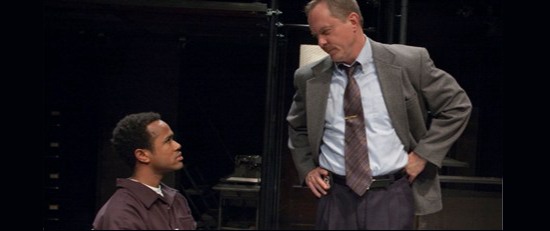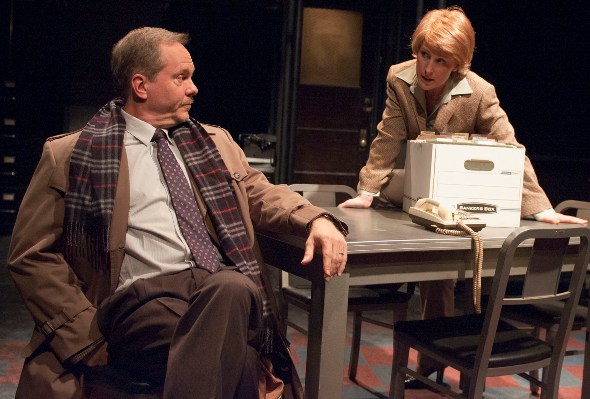‘My Kind of Town’ reconstructs police torture scandal as a complicated drama of real life
 Review: “My Kind of Town” by John Conroy, at TimeLine Theatre through July 29. ****
Review: “My Kind of Town” by John Conroy, at TimeLine Theatre through July 29. ****
By Lawrence B. Johnson
What’s most impressive about John Conroy’s play “My Kind of Town,” currently running in a mesmerizing world premiere at TimeLine Theatre, is its finesse and completeness as drama.
This tale of alleged torture of criminal suspects – especially black suspects – by the Chicago police, which Conroy investigated and reported for the Chicago Reader between 1990 and 2007, is not just another ain’t-it-awful moralizing screed like “The Exonerated.” Nor is it a mere process piece about how a bad thing was perpetrated, like “Enron,” TimeLine’s previous production.
 Conroy has created a kind of real-life composite, a hypothetical instance of a crime, a suspect with family complications, implicit – though not certain — torture to obtain a confession, and a hearing at which informed law enforcement officials are questioned directly about the matter.
Conroy has created a kind of real-life composite, a hypothetical instance of a crime, a suspect with family complications, implicit – though not certain — torture to obtain a confession, and a hearing at which informed law enforcement officials are questioned directly about the matter.
At no point does the playwright fall back on the easy or obvious. In the actual Chicago scandal, no police official was ever convicted of torture, though one high-ranking officer was sent to prison for perjury and obstruction of justice. Conroy even had on his side formal findings that some suspects probably were subjected to torture (though no charges were brought), and yet “My Kind of Town” maintains a circumspect objectivity.
Otha Jeffries is an angry young black man, and a known drug dealer, convicted of burning down a house and murdering its elderly occupants. He’s been on death row for several years when his case is reopened and he’s assigned a new public defender, a Latino who wants to make sure Otha gets a fair shake this time. The lawyer is also determined to discover the truth in Otha’s claim that his conviction was extracted by torture.
 Charles Gardner projects Otha’s consuming anger in all its complications. He’s a marginalized young man with no real options, the child of a father who was never there for him and eventually walked out on the boy and his mother. And, oh yes, the father who couldn’t handle the responsibilities of parenthood is a Chicago police officer — Trinity P. Murdock in a solid performance of painful conflict and personal guilt.
Charles Gardner projects Otha’s consuming anger in all its complications. He’s a marginalized young man with no real options, the child of a father who was never there for him and eventually walked out on the boy and his mother. And, oh yes, the father who couldn’t handle the responsibilities of parenthood is a Chicago police officer — Trinity P. Murdock in a solid performance of painful conflict and personal guilt.
If anything, Otha’s mother is even more conflicted, desperate to save her son’s life and yet alarmed by the increased rage the years in prison have nurtured in him. Ora Jones offers a credible portrait of a mom trying to sustain a semblance of family with a furious, dangerous son on death row and a weak-willed husband as her support.
Reporter-playwright Conroy draws the police side of the equation no less vividly. At its center is the willful, arrogant detective Dan Breen, played with fierce purpose by David Parkes. Breen openly touts his department’s 98 percent confession rate. But torture, nah. In a basement room fitted with dreadful devices? Never been down there.
 The detective has a wife (Danica Monroe) who believes in him, and she has a sister (Carolyn Hoerdemann) who’s not so sure. Some of the play’s best writing is edgy stuff between the sisters — the good wife and the sister who has moved to the West Coast and is so glad to be out of Chicago.
The detective has a wife (Danica Monroe) who believes in him, and she has a sister (Carolyn Hoerdemann) who’s not so sure. Some of the play’s best writing is edgy stuff between the sisters — the good wife and the sister who has moved to the West Coast and is so glad to be out of Chicago.
Detective Breen’s partner is a black cop, a physically imposing man but the good guy whenever the old good cop-bad cop routine is called for. A.C. Smith provides both the hulking frame and a vulnerable soul when intolerable pressures come to bear. The play’s single most imaginative vignette occurs in collapsed time when this cop caught in the middle finds himself besieged by assorted characters pressing their personal agendas, as if all at once.
Also somewhere in the middle stands the prosecuting attorney (Maggie Kettering) whose perspective shifts from confident affirmation of Detective Breen’s conduct to an examination of her own conscience. She’s pushed along that path by Otha’s new lawyer (Derek Garza), who sees the possibility of final justice in this woman’s testimony.
I said Conroy takes no easy way out in his story-telling. That includes the self-pitying, never-caught-a-break card that Otha throws down to his Latino lawyer in a grand display of indignation. In a powerful retort, Garza delivers a vivid account of his own escape from the slums. Otha, he says with some anger of his own, always had a choice.
Directed by the ever-resourceful Nick Bowling, “My Kind of Town” churns forward with provocative ambiguity, scene melding into scene thanks in part to Brian Sidney Bembridge’s efficient, adaptable set. Far from a rush to judgment, it is the even-handed work of a good reporter become adept dramatist, a mélange of characters and circumstances signifying life on the streets and at home in the kitchen. As for the ominous basement, who knows? We’re never down there.
Related Links:
- Conroy’s original article about Area 2 police torture appeared in 1990: Read “House of Screams” from the Chicago Reader
- Newspaper coverage of the belated aftermath: Read stories in the New York Times (2007) and Chicago Sun-Times (2008)
- Performance location, dates and times: Find details at TheatreinChicago.com
Photo captions and credits: Home page and top: Detective Breen (David Parkes, right) interrogates Otha Jeffries (Charles Gardner). Descending: Derek Garza, left, as the court-appointed lawyer for Otha (Charles Gardner). Reporter-playwright John Conroy. A testy meeting between Otha (Charles Gardner) and his father (Trinity P. Murdoch). Below: Assessing the torture claims against Detective Breen (David Parkes), attorney Maureen Buckley (Maggie Kettering) poses hard questions. (Photos by Lara Goetsch)
Tags: A.C. Smith, Brian Sidney Bembridge, Carolyn Hoerdemann, Charles Gardner, Danica Monroe, David Parkes, Derek Garza, John Conroy, Maggie Kettering, Nick Bowling, Ora Jones, TimeLine Theatre, Trinity P. Murdoch












